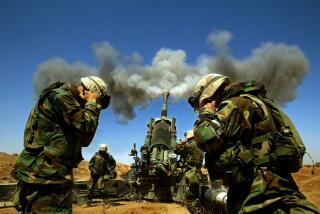A Dubious Iraq Policy
- Share via
President Clinton promises to support “forces of change” in Iraq, with the hope of seeing Saddam Hussein’s tyrannical regime replaced by a more representative and humane government. Congress has already endorsed that goal. Last month it passed the Iraq Liberation Act, which provides $97 million to arm and otherwise encourage Iraqi dissident groups. So the policy of the United States now overtly favors overthrowing a dictator who has held Iraq in an iron grip for nearly two decades. Sadly, there is little reason to think that desirable aim can be achieved any time soon.
Three major barriers stand in the way. First, anti-Hussein forces in Iraq are notoriously fragmented by sectarian, ethnic and clan differences and suspicions. They have been incapable of uniting in the past, and it is self-deluding cultural arrogance to assume that their unity can now be brokered by the United States or other outsiders. The ambitions and jealousies of key leaders--some of them plainly con men and hustlers--further stand in the way of cohesion.
Second, Hussein is the most ruthless leader the modern Arab world has known, even worse than his rival Hafez Assad in neighboring Syria. Hussein has held on to power by the most primitive of methods: He has killed anyone he suspected of disloyalty or dissent. His key instrument of control is a huge security apparatus that has been notably successful in infiltrating opposition groups. State terror is so pervasive that even family members often do not trust each other.
Third, nearby countries whose help would be essential in sustaining an Iraqi armed opposition fear the consequences of a possibly destabilized Iraq more than they fear Hussein’s survival. Turkey, battling its own restive Kurdish population, does not want to see the Kurds in northern Iraq grow stronger. Saudi Arabia fears that Iran’s influence could spread among the Shiite Muslims in southern Iraq, who constitute a majority of the country’s population. A chief reason the United States so abruptly halted the Persian Gulf War in 1991 was the concern of some of its allies, the Saudis especially, that if Hussein was overthrown Iraq would fall apart, threatening regional stability.
To announce a policy without exhaustively considering how it can be made to work is worse than an empty gesture; it is a dangerous one. It sets in motion pressures to act that can give rise to the most harebrained schemes; the Bay of Pigs invasion of Cuba in 1961 is a classic case in point. Gen. Anthony C. Zinni, the U.S. commander in the Persian Gulf, speaks for many in the Pentagon when he observes, “I don’t think these things have been thought out.” Clearly they haven’t been. And clearly the United States could find itself headed toward a costly blunder if it doesn’t stop to assess rationally and fully the implications of its hastily conceived new Iraq policy.
More to Read
Get the L.A. Times Politics newsletter
Deeply reported insights into legislation, politics and policy from Sacramento, Washington and beyond. In your inbox three times per week.
You may occasionally receive promotional content from the Los Angeles Times.










